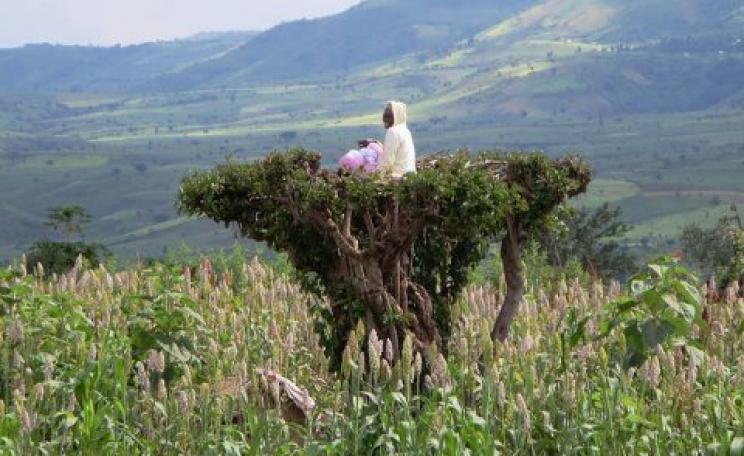Mining in East Kutai, Kalimantan. Image courtesy of World Development Movement.
Banks don’t have to tell the public exactly what fossil fuel projects they invest in
A coal mine might not be the first image triggered in your mind by the word ‘Borneo’. More likely, you might think of dense rainforests, a diverse array of indigenous peoples, and perhaps the iconic orangutan.
But the last decade has seen the inexorable rise of Indonesia as a major supplier of fossil fuels to the economic giants of East Asia. And the vast majority of the country’s coal comes from Kalimantan, the Indonesian part of Borneo.
UK banks have lent more money for Indonesian coal than banks from any other country since 2009, reveals a report released today by the World Development Movement, while Standard Chartered, the UK’s second biggest bank, has lent more than any other bank in the world. 83 per cent of coal produced in Indonesia’s top coal mining province, East Kalimantan, is mined by companies part-financed by UK banks. The top 5 banks, HSBC, Barclays, Standard Chartered, RBS and Lloyds, are all involved in bankrolling the coal boom.
The indigenous Dayak people of Kalimantan, who in recent decades have seen industrial logging seriously deplete the forests they rely on, are now confronting destruction on a much greater scale. Many have had to leave their homes to make way for coal mines, particularly in East Kalimantan where Indonesian company Bumi Resources runs a mining project with concessions covering 90,000 hectares. One Dayak community, Segading, has been displaced three times by the mines, and the local leader, Gagay, says his people are fighting against attempts to force them to move yet again.
Open pit coal mining is a far cry from the deep underground mines we associate with the industry in the UK. Bumi Resources’ mines have required the clearing of large areas of forest, with hillsides being cut open to expose layers of coal and earth. Once an area has been mined, the company moves on, leaving open scars and tailing ponds full of toxic waste.
Banks don’t have to tell the public exactly what fossil fuel projects they invest in
Bumi Resources has received a £127 million loan from Barclays. It also benefits from UK finance though the controversial firm Bumi plc, which owns 29 per cent of the Indonesian company and is listed on the London Stock Exchange.
A far bigger loan, from Standard Chartered, went in 2012 to another Indonesian coal company. The bank lent US$1 billion (£640 million) to Borneo Lumbung, which is pioneering coal extraction in the so far relatively unscathed province of Central Kalimantan. Waste from Borneo Lumbung’s mine has seeped into the local rivers, local woman Yesmaida told the World Development Movement’s researchers: ‘The river is now dark and dirty. Sometimes when we wash, it feels itchy. More importantly, we can’t drink the water anymore. The water used to be clean and clear, not like it is now.’
Following the lead of Indonesian companies like Borneo Lumbung, global mining giant BHP Billiton is planning to open mines across a vast 350,000 hectares in Central Kalimantan. BHP Billiton is listed on the London Stock Exchange, and since it is part of the exclusive FTSE100, almost every pension holder in the UK has money invested in it. BHP Billiton has also received a total of £6.3 billion from Barclays, Standard Chartered, RBS and Lloyds since 2009.
BHP Billiton’s mining concessions include some of Indonesia’s precious remaining rainforest, where the rivers are clean and people are still able to live from the land. Yesmaida fears the consequences of the project going ahead. ‘We don’t want mining companies to come to our village anymore,’ she says emphatically. ‘We have had enough.’
Yesmaida and Gagay’s experience of coal mining in Kalimantan is mirrored by that of millions of people across the world who face the fossil fuel ‘resource curse’. The UK finance sector is heavily invested in fossil fuels, not just in Indonesia but worldwide. Companies on the London Stock Exchange hold more coal reserves than those on any other stock exchange, while total fossil fuel shares on the exchange are worth £900 billion. The top 5 banks, meanwhile, underwrote bonds and shares in fossil fuel companies worth £170 billion between 2010 and 2012.
Little is being done to curb our financial system’s hunger for coal, oil and gas, or prevent ordinary people’s money being used to make possible the devastation their extraction causes in places like Kalimantan. Companies listing on the London Stock Exchange must meet certain criteria – but these relate solely to corporate governance and reporting. There is no official scrutiny of how a company’s activities affect human rights or the environment in countries where they operate, or its impact on climate change.
As the Intergovernmental Panel on Climate Change (IPCC) made clearer than ever last week, climate change is happening, and it is being caused by human activity. UK banks have made public statements about the need for urgent action, and are trumpeting their investments in renewable energy. Yet they continue to pour billions into fossil fuels, and once again there is little regulation. New rules coming into force today require big UK companies to make their carbon emissions public – but banks will not have to disclose the emissions from fossil fuels they finance. In fact, banks don’t even have to tell the public exactly what fossil fuel projects they invest in.
Forcing banks and pension funds to disclose information on their dirty energy investments and the resulting carbon emissions, and using the listing criteria to prevent destructive companies like Bumi plc or BHP Billiton accessing finance, would be first steps towards reducing the finance sector’s involvement in fossil fuels. We cannot deal with the climate crisis without taking back public control of finance.
Evidence from the IPCC scientists, and from Gagay and Yesmaida, suggests that now is a good time to start.
Miriam Ross is a campaigner at the World Development Movement.
| READ MORE... | |
 |
NEWS ANALYSIS New Australian Prime Ministers' anti-environmental agenda Australian environmentalists' declare new Prime Minister, Tony Abbotts' green agenda as ‘anti-environmental', designed only to profit the mining industry at the cost of climate change solutions, reports Maxine Newlands...... |
 |
COMMENT Open Letter to Prince Charles about Cyanide mining in Romania Rupert Wolfe Murray writes to Prince Charles about his grave concerns for the Rosia Montana region of Transylvania, under threat from Cyanide mining....... |
 |
NEWS ANALYSIS The heavy price of Greek gold The birthplace of Aristotle is being laid waste by a vast mining project, opening a rift in a cash-strapped society |
 |
NEWS ANALYSIS How illegal sand mining in Sierra Leone is destroying the local beaches Ramatu Kanu is a citizen journalist based in Freetown, Sierra Leone. She is being trained by Radar - a new charity that trains marginalised groups to report on what would otherwise be neglected news and environmental stories. Here, Ramatu investigates the impact of illegal sand mining in Sierra Leone... |
 |
NEWS ANALYSIS The carbon markets are dead, long live the carbon markets Political inertia and empty rhetoric are diluting and undermining the efforts of market based mechanisms to tackle climate change........ |








